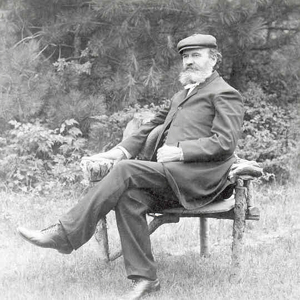by Tim Cameron | Jul 4, 2015 | A. B. Simpson, prayer

Prayer is the link that connects us to God. It is the bridge that spans every gulf and bears us over every abyss of danger or of need.
How significant the picture of the apostolic church: Peter in prison, the Jews triumphant, Herod supreme, the arenas of martyrdom awaiting the dawn of the morning to drink up the apostle’s blood—everything against the church.
But prayer was made without ceasing of the church unto God for Peter. And what was the sequel? The prison open, the apostle free, Jews baffled, the wicked king eaten of worms—a spectacle of hideous retribution—and the Word of God rolling on in greater victory.
Do we know the power of our supernatural weapon? Holy Spirit empowered prayer.
Do we dare to use it with the authority of faith that commands as well as asks? May God baptize us with the Holy Spirit and audacity and divine confidence. He does not want great men and women, but He is wanting men and women who will dare to prove the greatness of their God in prayer.
But God! But Prayer!
There is a lost standard in the church today. The church has lost possession of its secret—the awareness that it is only by living in the power of the Holy Spirit that the gospel can be preached in power. Because of this there is a lot of preaching and working with few spiritual results. There is little prayer that brings down the power of God.
Albert Benjamin Simpson was born on December 15, 1843, to parents of Scottish descent. He grew to be one of the most respected and important Christian figures in American evangelicalism. A much sought after speaker and pastor, Simpson founded a major evangelical denomination and the Christian and Missionary Alliance, which sent thousands of missionaries around the world. He published over 70 books, edited a weekly magazine for nearly 40 years, and wrote many gospel songs and poems. He devoted his entire life to the spread of the gospel.
by Tim Cameron | Jun 25, 2015 | prayer
Is It Sin Not to Pray?
Pray without ceasing. “As for me, I will certainly not sin against the Lord by ending my prayers for you” (1 Samuel 12:23).
We must pray for the power of the Holy Spirit in our fellowship.
It is a sin against the Lord to not pray for our fellowship, pastors, and missionaries. Every one of us needs to see how indispensable our intersession is. It is every bit just as much a duty as loving our Lord. I know we don’t respond well to duty and don’t want to do things out of duty.
However, look at duty in this sense: Duty is a term that conveys a sense of commitment. It is not a matter of passive feeling or mere recognition. When someone commits himself or herself to the fulfillment of a duty, they do it without consideration to their own self-interest. It requires the sacrifice of immediate self-interest.
Ask today for grace to fill the role of intercessor with joy and give your life to bring down the blessings of heaven on our fellowship, pastors, and missionaries.
by Tim Cameron | Jun 22, 2015 | prayer, T. M. Anderson
I was teaching in the department of religious studies in Asbury College when I entered into the covenant of prayer with Christ. It had been my purpose for several months to prepare some written messages on the Epistle of Hebrews. In order to have time to devote to this work it was necessary for me to arise early in the morning and do the writing before the hour I was scheduled to meet my classes. I began this work during the first week of 1950.
I was suddenly awakened about midnight on January sixth. Knowing that I had a full day of work before me, I felt it necessary to sleep a few hours lest I be too weary in mind and body to do the writing and teaching. At that moment the Savior spoke to me. He asked me if I were willing to sacrifice some sleep in order to give Him an opportunity to speak with me in the quiet hours of the morning. He told me that it was necessary to deny myself of sleep in order to prevail in prayer. I realized for the first time that denying myself of sleep was a form of fasting. For five hours I waited before the Lord in sacred worship and holy communion. My soul was greatly revived, and I felt refreshed in mind and rested in body.
After this remarkable manifestation of the savior I was constrained to examine my prayer life. I was impressed to consider the time spent in prayer during the average day. I was humbled before the Lord when I discovered how little time had been given to Him in prayer and meditation. It had been my daily practice from the day I was saved to spend some time in prayer morning and evening. I had established the family altar in my home. I had spent time in secret prayer during the years of my ministry. I had never knowingly overlooked the importance of prayer. I am now aware that I had never discovered the possibilities in prayer like they were revealed to me when I waited five delightful hours before the Savior that memorable morning.

by Tim Cameron | Jun 14, 2015 | prayer
LESSON TWO.
PRAY ABOUT ALL THE THINGS
BY T. M. ANDERSON
“Be careful for nothing; but in every thing by prayer and supplication with thanksgiving let your requests be made know unto God.” Phil. 4:6
This timely exhortation stresses the fact that God’s people should consult with Him in every matter pertaining to life. Unless they see the imperative necessity of prayer, and give it an important place in daily life, they cannot expect to be maintained by the ample resources of a generous Savior. It is apparent that we cannot obtain the things essential to life unless we make everything pertaining to life a matter of earnest prayer. It is impossible to live a consistent Christian life in the sight of God by praying occasionally. Praying intermittently is certainly not praying incessantly and importunately. Such careless praying is not consistent with the exhortation to pray without ceasing.
Praying spasmodically, we are like men that gorge themselves with food and drink on special occasions and starve themselves between feasts. We do not live from feast to famine when we enter into a partnership with Christ in prayer. We are not disturbed by doubts and defeats when we make everything a matter of earnest prayer. We enjoy an unbroken fellowship with Christ when we make our requests known unto Him in daily prayer. He imparts to us the necessary strength to cope with the temptations and trials incident to life in this benighted world when everything relating to life is made known unto Him in prayer. When the inspired Apostle said, “…Let your requests be made known unto God,” he was obviously emphasizing the importance of revealing to the Lord everything required to sustain us in life. We find it necessary to reveal both our spiritual and our temporal needs unto Him in prayer. Nothing pertaining to our life in this world is unimportant in the sight of God. He is interested in everything that concerns us in life.

by Tim Cameron | Jun 4, 2015 | prayer

LESSON ONE
GOD’S PEACE OBTAINED IN ANSWER TO PRAYER
“….Let your requests be made known unto God. And the peace of God which passeth all understanding, shall keep your hearts and minds through Christ Jesus.” Phil. 4:7
When we make our requests know unto God by prayer and supplication with thanksgiving we are assured of receiving His peace through Christ Jesus. When we enter into the sacred Presence of the Prince of Peace, we enter into the place of perfect peace. The house of prayer is the sanctuary of peace.
Christ imparts a measure of His own peace to our worshiping hearts when we make everything pertaining to life a matter of prayer. It is not necessary for the children of God to enter heaven in order to enjoy the priceless possession of peace. It is obvious that Jesus has purposed that His own peace shall give His praying and believing people untroubled hearts in this world of trouble.
There will be times when our feelings will contradict our faith. Sickness can depress our emotions to such an extent that we are disposed to doubt even our relationship with Christ. There will be times when we stand on the brink of an impassible gulf which the human understanding cannot cross. But, the Savior has paid a great price to redeem all. He will not withhold His saving grace and mercy from any seeking soul longing with all the heart to please Him in all things. The peace of God will prevent us from becoming the hapless prey of distraught minds if we will pray without ceasing, and continue to believe on the name of Jesus. If we continue to make our requests known unto God by prayer and supplication with thanksgiving, He will not suffer us to be moved by the forces of evil in this earth.
by Tim Cameron | May 21, 2015 | prayer
We must be “Devoted to Prayer”
Church history began with her disciples devoted to the Word of God and to prayer (Acts 2:43; 6:4). Every day the leaders gathered to pray and minister to the Lord (Acts 3:1). In this clarity of vision and simplicity of purpose, the church of Jesus Christ never had greater power or capacity to make true disciples. If we want to make disciples, we must be given to prayer. These men and women revealed the purity of the kingdom of God.
Today, however, our qualifications for church leadership include almost everything but devotion to God’s Word and prayer. Leaders are expected to be organizers, counselors, and individuals with winning personalities whose charms alone can draw people.
In Luke 18, Jesus challenges our modern traditions. He asks, “When the Son of Man comes, will He find faith on the earth?” (v.8). His question is a warning to Christians who would limit the power of God at the end of the age. Jesus is calling us to resist the downward pull of our traditions; He is asking us individually, “Will I find faith in you?”
Before we respond, let us note that Jesus associates faith with “day-and-night” prayer (Luke 18:7). He is not asking, “Will I find correct doctrines in you?” The Lord’s question does not so much concern itself with right knowledge as with right faith. What we believe is important, but how we believe is vital in securing the help of God.
Indeed, procuring the supernatural help of God is exactly the point of Jesus’ parable in Luke 18. His intent was to show that “at all times” we “ought to pray and not to lose heart” (Luke 18:1). To illustrate the quality of faith He seeks, He followed His admonition with a parable about a certain widow who petitioned a hardened judge for “legal protection” (v.3). Although the judge was initially unwilling, yet by her “continually coming” (v.5) she gained what was legally hers.
Jesus concluded by asking: “If an unrighteous judge will respond to a widow’s persistence, shall not God avenge quickly His elect, who cry to Him day and night, and will He delay long over them?” Jesus said, “I tell you that He will bring about justice for them speedily.” (See Luke 18:1-8.)



